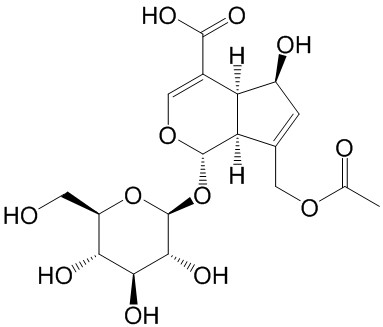Home
Products
Asperulosidic acid



| Product Name | Asperulosidic acid |
| Price: | $277 / 5mg |
| Catalog No.: | CN03105 |
| CAS No.: | 25368-11-0 |
| Molecular Formula: | C18H24O12 |
| Molecular Weight: | 432.4 g/mol |
| Purity: | >=98% |
| Type of Compound: | Iridoids |
| Physical Desc.: | Powder |
| Source: | The herbs of Hedyotis diffusa Willd. |
| Solvent: | DMSO, Pyridine, Methanol, Ethanol, etc. |
| SMILES: | OCC1OC(O[C@@H]2OC=C([C@@H]3[C@H]2C(=C[C@@H]3O)COC(=O)C)C(=O)O)C(C(C1O)O)O |
| Contact us | |
|---|---|
| First Name: | |
| Last Name: | |
| E-mail: | |
| Question: | |
| Description | Asperulosidic Acid (ASPA), a bioactive iridoid glycoside, is extracted from the herbs of Hedyotis diffusa Willd. Asperulosidic Acid (ASPA) has anti-tumor, anti-oxidant, and anti-inflammatory activities[1].ASPA is related to the inhibition of inflammatory cytokines (TNF-α, IL-6) and mediators via suppression of the NF-κB and mitogen-activated protein kinase (MAPK) signaling pathways[2]. |
| In Vitro | Asperulosidic Acid (ASPA) (40-160 μg/mL; pre- 1 hour) significantly down-regulates the mRNA levels of TNF-α and IL-6 in LPS-induced RAW 264.7 cells compared with the group treated with LPS alone [1]. Asperulosidic Acid (ASPA) (40-160 μg/mL; pre- 1 hour) decreases IκB-α phosphorylation in a concentration-dependent manner, decreases Erk1/2 phosphorylation at all concentration levels, but there was no effect on p-p38 [1]. RT-PCR[2] Cell Line: RAW 264.7 cells Concentration: 40 μg/mL, 80 μg/mL, and 160 μg/mL Incubation Time: Pre-treatment 1 hour Result: Decreased TNF-α and IL-6 mRNA expression. Western Blot Analysis[2] Cell Line: RAW 264.7 cells Concentration: 40 μg/mL, 80 μg/mL, and 160 μg/mL Incubation Time: Pre-treatment 1 hour Result: Decreased IκB-α phosphorylation and Erk1/2 phosphorylation. |
| Density | 1.64±0.1 g/cm3 |
| Exact Mass | 432.12700 |
| PSA | 192.44000 |
| Storage condition | 2-8°C |